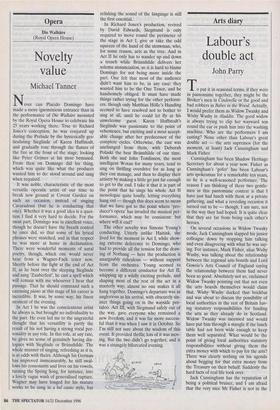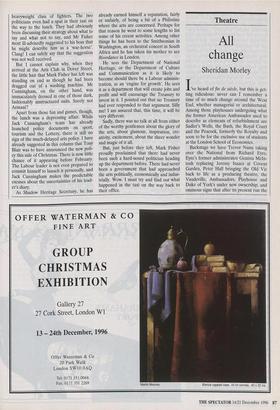Arts diary
Labour's double act
John Parry
To put it in seasonal terms, if they were in pantomime together, they might be the Broker's men in Cinderella or the good and bad robbers in Babes in the Wood. Actually, I would prefer them as Widow Twanky and Wishy Washy in Aladdin. The good widow is always trying to clip her wayward son round the ear or push him into the washing machine. Who are the performers I am casting? None other than Labour's great double act — the arts supremos (for the moment, at least) Jack Cunningham and Mark Fisher.
Cunningham has been Shadow Heritage Secretary for about a year now. Fisher as Cunningham's 'gofer' has been Labour's arts spokesman for a remarkable ten years, so he is a well-seasoned performer. The reason I am thinking of these two gentle- men in this pantomime context is that I have just had lunch with them at a private gathering, and what a revealing occasion it turned out to be — though, I am sure, not in the way they had hoped. It is quite clear that they are far from being each other's heroes.
On several occasions in Widow Twanky mode, Jack Cunningham slapped his junior colleague down by stopping him talking and even disagreeing with what he was say- ing. For instance, Mark Fisher, alias Wishy Washy, was talking about the relationship between the regional arts boards and Lord Gowrie's Arts Council of England saying the relationship between them had never been so good. Absolutely not so, exclaimed Widow Twanky pointing out that not even the arts boards themselves would claim that. Wishy Washy ducked that brickbat and was about to discuss the possibility of local authorities in the rest of Britain hav- ing statutory responsibilities for funding the arts as they already do in Scotland. Widow Twanky was incensed and would have put him through a mangle if the lunch table had not been wide enough to keep them well separated. What would be the point of giving local authorities statutory responsibilities without giving them the extra money with which to pay for the arts? There was clearly nothing on his agenda about begging for that extra money from the Treasury on their behalf. Suddenly the hard facts of real life took over.
Jack Cunningham has the reputation of being a political bruiser, and I am afraid that the very nice Mr Fisher is not in the heavyweight class of fighters. The two politicians even had a spat in their taxi on the way to the lunch. They had obviously been discussing their strategy about what to say and what not to say, and Mr Fisher most ill-advisedly suggested to his boss that he might describe him as a 'war-horse'. Clang! I can safely say that the suggestion was not well received.
But I cannot explain why, when they arrived at the Arts Club in Dover Street, the little hair that Mark Fisher has left was standing on end as though he had been dragged out of a washing machine. Mr Cunningham, on the other hand, was immaculately dressed in one of those dark, fashionably unstructured suits. Surely not Armani?
Apart from those fun and games, though, the lunch was a depressing affair. While Jack Cunningham's team has already launched policy documents on sport, tourism and the Lottery, there is still no sign of the much-delayed arts policy. I have already suggested in this column that Tony Blair was to have announced the new poli- cy this side of Christmas. There is now little chance of it appearing before February. The Labour leader is not even prepared to commit himself to launch it personally, and Jack Cunningham makes the predictable excuses about the uncertainties of his lead- er's diary. As Shadow Heritage Secretary, he has already earned himself a reputation, fairly or unfairly, of being a bit of a Philistine where the arts are concerned. Perhaps for that reason he went to some lengths to list some of his recent activities. Among other things he has been to the Smithsonian in Washington, an orchestral concert in South Africa and he has taken his mother to see Riverdance in London.
He sees the Department of National Heritage, or the Department of Culture and Communication as it is likely to become should there be a Labour adminis- tration, as an 'engine for growth'. He sees it as a department that will create jobs and profit and will encourage the Treasury to invest in it. I pointed out that no Treasury had ever responded to that argument. Silly me! I am assured that, this time, it will be very different.
Sadly, there was no talk at all from either of the worthy gentlemen about the glory of the arts, about glamour, inspiration, cre- ativity, excitement, about the sheer wonder and magic of it all.
But, just before they left, Mark Fisher proudly proclaimed that there had never been such a hard-nosed politician heading up the department before. There had never been a government that had approached the arts politically, economically and indus- trially. Wow. I must try and find out what happened in the taxi on the way back to their office.



















































































































 Previous page
Previous page